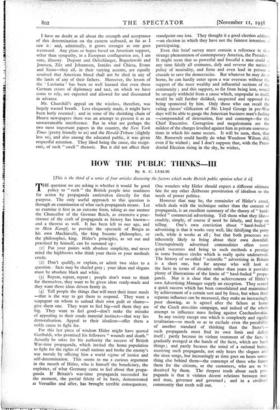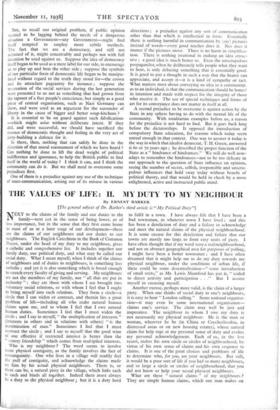HOW THE PUBLIC THINKS III
By S. C. LESLIE
[This is the third of a series of four articles discussing the factors which make British public opinion what it is] THE question we are asking is whether it would be good policy to " rush " the British people into readiness for action by propaganda undertaken directly for that purpose. The only useful approach to this question is through an examination of what such propaganda means. Let us examine it first in an extreme form, taking as our mentor the Chancellor of the German Reich, as extensive a prac- titioner of the craft of propaganda as history has known— and a theorist as well. It has been left to our age, and to Mein Kampf, to provide the spectacle of Borgia as his own Machiavelli, the king become philosopher, or the philosopher, king. Hitler's principles, as set out and practised by himself, can be summed up : (i) Put your points with absolute simplicity, and never mind the highbrows who think your thesis or your methods crude.
(2) Don't qualify, or explain, or admit two sides to a question : facts may be shaded grey ; your ideas and slogans must be absolute black and white.
(3) Repeat, repeat, repeat ; people don't want to think for themselves, they want to he given ideas ready-made and they want those ideas driven firmly in.
(4) Tell people the things that will meet their inner needs —that is the way to get them to respond. They want a scapegoat on whom to unload their own guilt or shame— give them one. They want to feel big—tell them they are big. They want to feel good—don't make the mistake of appealing to their crude material instincts—that way lies demoralisation. Appeal to their idealism—offer them a noble cause to fight for.
For this last piece of wisdom Hitler might have quoted Garibaldi, who promised his followers "wounds and death."
Actually he takes for his authority the success of British War-time propaganda, which invited the home population to fight for the rights of small nations and broke the enemy's war morale by offering him a world regime of justice and self-determination. This seems to me a curious argument in the mouth of Hitler, who is himself the beneficiary, the exploiter, of what Germany came to feel about that propa- ganda. If Britain's war-time propaganda succeeded for the moment, the partial falsity of its basis, demonstrated at Versailles and after, has brought terrible consequences. One wonders why Hitler should expect a different ultimate fate for any other deliberate prostitution of idealism to the needs of power politics.
However that may be, the remainder of Hitler's creed, which deals with the technique rather than the content of propaganda, is an excellent summary of the theory of" hard- boiled" commercial advertising. Tell them what they like— crudely, simply, of course if need be falsely, and keep on telling. One's own conviction about " hard-boiled " advertising is that it works very well, like falsifying the petty cash, while it works at all ; but that both processes are inherently likely to bring about their own downfall. Unscrupulously advertised commodities often score quick successes and bring to such methods a prestige in some business circles which is really quite undeserved. The history of so-called " scientific " advertising in Britain is a short one, but for anyone who will look at the facts in terms of decades rather than years it provides plenty of illustrations of the limits of" hard-boiled" propa- ganda. Nor is it clear that the achievements of Hitler's own Advertising Manager supply an exception. They scored a quick success which has been consolidated and maintained by achievement of a certain sort and by force, but when their separate influence can be measured, they make an increasingly poor showing, as is agreed after the failure at home of the Czech atrocities campaign, and indeed of the whole attempt to influence mass feeling against Czechoslovakia.
In any society except one which is completely and rigidly tetalitarian—so much so as to exclude even the possibility of another standard of thinking than the State's— such propaganda must find its own limit and defeat itself; partly because its violent treatment of the facts is gradually avenged at the hands of the facts, which are hard things ; and partly because the mind of a rational being, receiving such propaganda, not only hears the slogans and the siren songs, but increasingly as time goes on hears some- thing else behind them—the contempt of those who frame them for the citizens, or the customers, who are to be deceived by them. The deepest truth about such pro- paganda is that it violates decent relations between man and man, gOvemor and governed ; and in a civilised community that truth will out. But, to recall our original problem, if public opinion seemed to be lagging behind the needs of a dangerous situation a Govemment—any Government—might find itself tempted to employ more subtle methods. The fact that we are a democracy, and still not ashamed of it, might conceivably and perhaps not with full intention be used against us. Suppose the idea of democracy itself began to be used as a mere label for our side, to encourage us to play up and beat the other side ; suppose the symbols of our particular form of democratic life began to be manipu- lated without regard to the truth they stood for—the crown and its attendant pageantry for instance ; suppose the re-creation of the social services during the last generation were presented to us not as something that had grown from the taproot of a free people's conscience, but simply as a good piece of central organisation, such as Nazi Germany can show, and were used as an argument for the surrender of liberty in the cause of bigger and better soup-kitchens ?
It is essential to be on guard against such falsifications —which might arise without deliberate intent. If they did, and were successful, we should have sacrificed the essence of democratic thought and feeling in the very -act of jerry-building a defence for it.
Is there, then, nothing that can safely be done in the direction of that moral rearmament of which we have heard ? Can nothing be done to lift the dead weight of political indifference and ignorance, to help the British public to find itself in the world of today ? I think it can, and I think the community can do it. But we shall need to overcome some prejudices first.
One of them is a prejudice against any use of the technique of mass-communication, arising out of its misuse in various directions ; a prejudice against any sort of communication other than that which is intellectual in form. Essentially there is nothing harmful in communication by (say) pictures instead of words—every good teacher does it. Nor does it matter if the pictures move. There is no harm in simplifica- tion. There is nothing irrational in making an idea attrac- tive; a good idea is much better so. Even the unscrupulous propagandist, when he deliberately tells people what they want to hear, is only debasing something that is essentially good. It is good to put a thought in such a way that the hearer can appreciate, and accept it—it is a kind of sympathy or tact. What matters most about conveying an idea to a community.. as to an individual, is that the communication should be hones'.' in intention and made with respect for the integrity of those who receive it. The use of special techniques and forms of art for its conveyance does not matter in itself at all.
A second prejudice to be overcome is against action by the State in any sphere having to do with the mental life of the community. With totalitarian examples before us, a reason for the prejudice is not hard to find. But it goes back long before the dictatorships. It opposed the introduction of compulsory State education, for reasons which today seem unreal enough in that context. One way to answer it today is the way in which that idealist democrat, T. H. Green, answered it Go or 70 years ago ; he described the proper function of the State as a " hindrance of hindrances." We will do well now- adays to remember the hindrances—not to be too delicate in our approach to the question of State influence on opinion, seeing the number of secret, selfish, irreponsible and unscru- pulous influences that hold sway today without benefit of political theory, and that would be held in check by a more enlightened, active and instructed public mind.











































 Previous page
Previous page